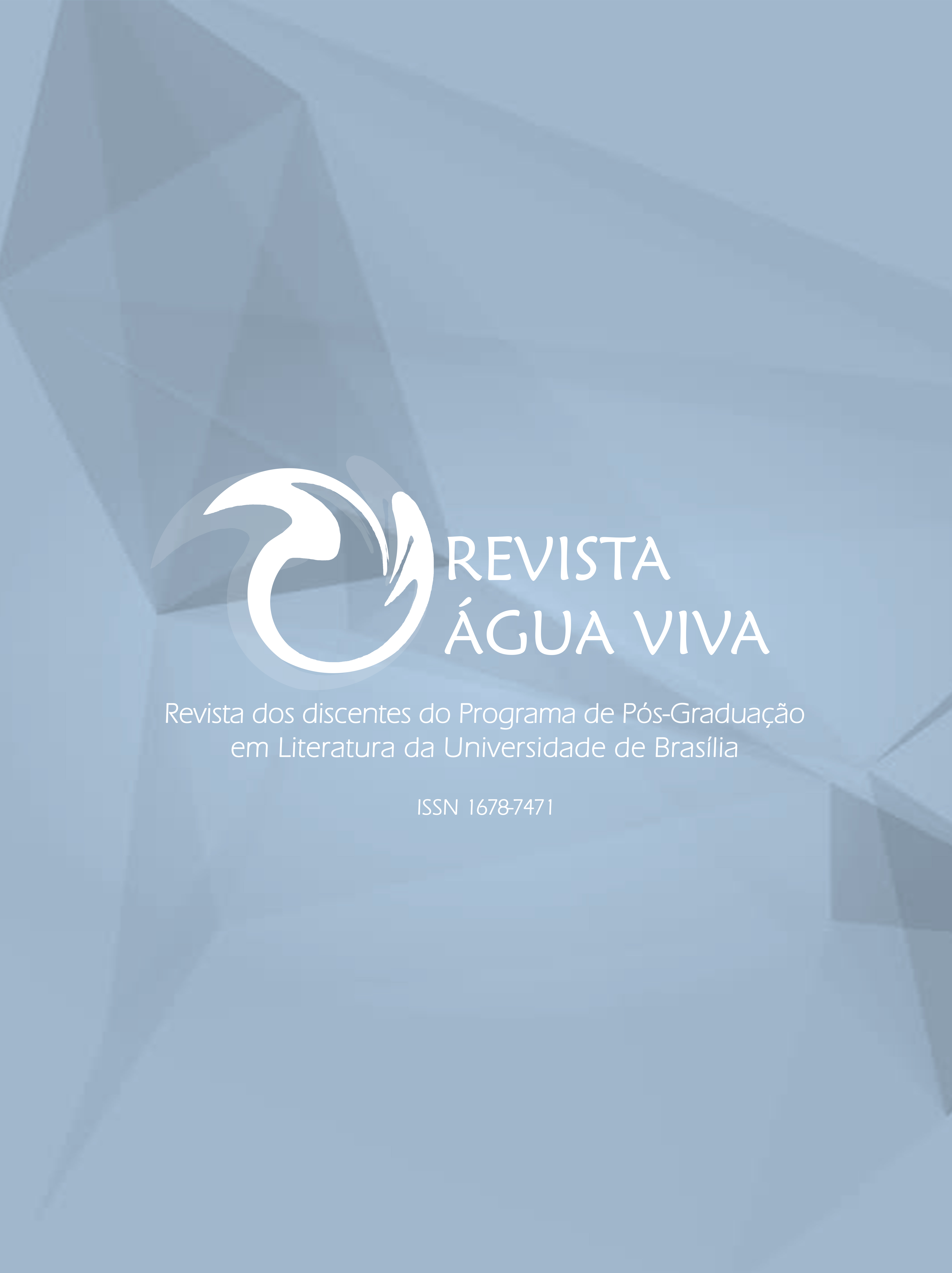MY SON’S GOING TO BE A WRITER
PATERNITY AND WRITING IN NADINE GORDIMER’S MY SON’S STORY
DOI:
https://doi.org/10.26512/aguaviva.v6i1.31996Keywords:
Oedipus, Writing, Identity, Nadine Gordimer, FatherAbstract
This paper seeks to make an interpretation of the work My son’s story (1990), by South African writer Nadine Gordimer (1923-2014), according to the premises of psychoanalysis and literary criticism focused on the notion of influence. Starting from the psychoanalytic concept Name of the Father, we seek to elucidate how Gordimer’s work emphasizes the characteristics of the concept brought from Lacan’s studies, in the levels of plot (relationship between characters) and writing, having as subsidy the Cultural Studies that address issues concerning to the relationship Literature-Identity. Thus, we consider Gordimer’s quest to advance the ideas of origin, identity, writing and fight at the mentioned levels and how they are important in debating the concept of “Father” in South African literature.
Downloads
References
APPIAH, Kwane Anthony. Na casa do meu pai: a África na filosofia da cultura. Trad. Vera Ribeiro. Rio de Janeiro: Contraponto, 1997.
BHABHA, Homi K. O local da cultura. Trad. M. Ávila, E. Lourenço e G. R. Gonçalves. Belo Horizonte: Editora UFMG, 1998.
BHABHA, Homi K. Para (re)situar a Fanon. In: BHABHA, Homi K. Nuevas minorías, nuevos derechos: notas sobre cosmopolitismos vernáculos. Trad. Hugo Salas. Buenos Aires: Siglo Veintiuno, 2013.
BLOOM, Harold. A angústia da influência: uma teoria da poesia. Trad. Marcos Santarrita. 2. ed. Rio de Janeiro: Imago, 2002.
BLOOM, Harold. O cânone ocidental: os livros e a escola do tempo. Trad. Marcos Santarrita. Rio de Janeiro: Objetiva, 1995.
BRITTON, Celia. Structuralist and post-structuralist psychoanalytic and marxist theories. In: SELDON, Raman (org.). Cambridge history of literary criticism: from Formalism to Post-structuralism (vol. 8). Cambridge: Cambridge University Press, 1995.
EAGLETON, Terry. Teoria da literatura: uma introdução. Trad. Waltensir Dutra. 4. ed. São Paulo: Martins Fontes, 2006.
FANON, Frantz. Pele negra, máscaras brancas. Trad. Renato da Silveira. Salvador: EDUFBA, 2008.
FOKKEMA, Douwe. Interpretação e explicação. In: FOKKEMA, Douwe e ELRUD, Ibsch. Conhecimento e compromisso. Trad. Sara Viola Rodrigues. Porto Alegre: UFRGS, 2006.
FREUD, Sigmund. Totem e tabu. Trad.Vera Ribeiro. Rio de Janeiro: Imago, 1996.
GLISSANT, Edouard. Le discours antillais. Paris: Seullis, 1981.
GORDIMER, Nadine. A história do meu filho. Trad. Geraldo Galvão Ferraz. São Paulo: Siciliano, 1992.
GORDIMER, Nadine. My son’s story. London: Bloomsbury, 2003.
HUTCHEON, Linda. Uma teoria da paródia: ensinamentos das formas de arte do século XX. Trad. Tereza Louro Pérez. Lisboa: Edições 70, 1985.
IWUANYANWU, Obiwu. In the name of the father Lacanian reading of four white South African writers. Syracuse: Syracuse University, ProQuest, UMI Dissertations Publishing, n. 56, 2011. Disponível em: http://surface.syr.edu/eng_etd/56 Acesso: 10 jan. 2014.
LACAN, Jacques. Introduction to the Names-of-the-father seminar. Trad. Jeffrey Mehlman. In: The MIT Press: Pensylvania, 1987.
LACAN, Jacques. Sobre o complexo de Édipo. In: LACAN, Jacques. Seminário 4: a relação de objeto. Trad. Dulce Duque Estrada. Rio de Janeiro: Jorge Zahar, 1995.
LEWIS, Gavin. Between the wire and the wall: a history of South Africa coloured politics. In: Collected seminar papers on “The societies on the Southern Africa in the 19th and 20th centuries”. London: University of London, 1987.
MWANGI, Ewan Maina. Africa writes back to self: metafiction, gender, sexuality. New York: Sunny Press, 2009.
SAID. Edward W. Freud e os não europeus. In: AURÉLIO, Daniel Rodrigues. Freud: Guias da Psicanálise. Trad. Arlene Clemesha. São Paulo: Escala, 2013.
SPIVAK, Gayatri C. Pode o subalterno falar?. Trad. S. R. G. de Almeida, M. P. Feitosa e A. P. Feitosa. Belo Horizonte: UFMG, 2010
Downloads
Published
How to Cite
Issue
Section
License
Copyright (c) 2021 Revista Água Viva

This work is licensed under a Creative Commons Attribution-NonCommercial-NoDerivatives 4.0 International License.
Direitos Autorais para artigos publicados nesta revista são do autor, com direitos de primeira publicação para a revista. Em virtude da aparecerem nesta revista de acesso público, os artigos são de uso gratuito, com atribuições próprias, em aplicações educacionais e não-comerciais.













